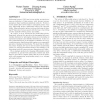Free Online Productivity Tools
i2Speak
i2Symbol
i2OCR
iTex2Img
iWeb2Print
iWeb2Shot
i2Type
iPdf2Split
iPdf2Merge
i2Bopomofo
i2Arabic
i2Style
i2Image
i2PDF
iLatex2Rtf
Sci2ools
CCS
2015
ACM
2015
ACM
Differential Privacy with Bounded Priors: Reconciling Utility and Privacy in Genome-Wide Association Studies
Differential privacy (DP) has become widely accepted as a rigorous definition of data privacy, with stronger privacy guarantees than traditional statistical methods. However, recent studies have shown that for reasonable privacy budgets, differential privacy significantly affects the expected utility. Many alternative privacy notions which aim at relaxing DP have since been proposed, with the hope of providing a better tradeoff between privacy and utility. At CCS’13, Li et al. introduced the membership privacy framework, wherein they aim at protecting against set membership disclosure by adversaries whose prior knowledge is captured by a family of probability distributions. In the context of this framework, we investigate a relaxation of DP, by considering prior distributions that capture more reasonable amounts of background knowledge. We show that for different privacy budgets, DP can be used to achieve membership privacy for various adversarial settings, thus leading to an...
| Added | 17 Apr 2016 |
| Updated | 17 Apr 2016 |
| Type | Journal |
| Year | 2015 |
| Where | CCS |
| Authors | Florian Tramèr, Zhicong Huang, Jean-Pierre Hubaux, Erman Ayday |
Comments (0)

